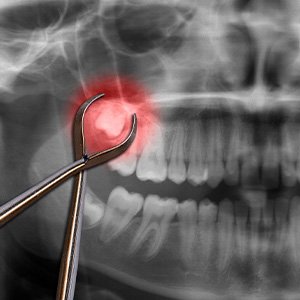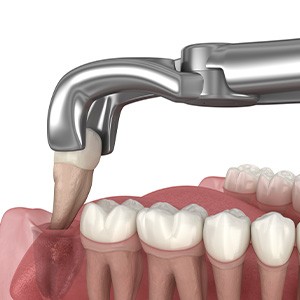Wisdom Tooth Extractions – Chaska, MN
Wisely Removing Troublesome Teeth
Somewhere between the ages of 16 and 25, most people's third molars begin to erupt through the gumline at the very back of their mouths. These are more commonly known as “wisdom teeth.” They were very useful to our ancient ancestors to help them chew the coarse roots, fibrous plants, and uncooked meats that were very common for the diet at the time. Back then, this daily wear and tear would cause a person to lose some of their molars as they got older, and the wisdom teeth simply replaced them. However, thanks to modern dentistry and cooking techniques, they are no longer needed, so the human jaw began to shrink slowly over time. Unfortunately, nature being what it is, most people still have their wisdom teeth despite this. Contact us if yours begin to cause problems or if you may be wondering if you should undergo wisdom tooth extractions in Chaska, MN.
Why Choose Chaska Dental Center for Wisdom Tooth Extractions?
- Painless Anesthetic Given via The Wand™
- Safe, Relaxing Nitrous Oxide Sedation Available
- We See Patients of All Ages
Why Wisdom Teeth Need to Be Removed

The modern jaw often can't accommodate the wisdom teeth, and this can lead to two unhealthy conditions: crowding of the existing permanent teeth and/or impaction – the incoming molars getting stuck in place. Your family dentist in Chaska will typically start keeping an eye on the developing wisdom teeth of a patient around age 11 or 12, and they will usually recommend extraction before 17-19 years of age. The goal is to extract the teeth before they can cause any problems. It’s much simpler to remove them while they are not causing any issues than to wait until a person is experiencing pain and soreness, and they need to be removed by an emergency dentist.
What Happens If Wisdom Teeth Are Not Removed?

While extracting these teeth may not sound like a lot of fun, it's far better than the alternative. Crowded teeth can misalign your bite, create chronic jaw pain, make you more vulnerable to gum disease, and cause dental problems for the rest of your life. Partially erupted wisdom teeth allow bacteria and germs to accumulate and multiply, which can lead to an infection or the formation of cysts. In fact, even tumors can grow on a trapped wisdom tooth.
Impacted or partially erupted wisdom teeth often try to force their entry by pushing up in whichever direction they find the most give: sideways, vertically, backward, or forward. They can then become stuck while still fully encased in the jawbone (called a bony impaction) or prior to erupting through the gums (called a soft tissue impaction). Both of these situations can easily cause pain, swelling, and an infection. Eventually, the infection can spread to the jawbone, which can weaken its ability to hold the other teeth in place.
If you have any questions or are currently feeling discomfort because of your wisdom teeth, be sure to contact our dental office today.
Understanding the Cost of Wisdom Tooth Extractions

The cost of wisdom tooth extractions is different for each patient. The factors that our dentists will consider before generating an estimate that you can review require careful consideration. As part of your consultation, we will compile all of this information so that you experience no surprises when it is time to pay for treatment. Our team will even review your available benefits and discuss alternative financing options so that your focus remains on your oral health and not on the cost.
Factors That Can Impact the Cost of Wisdom Tooth Extractions

There are many different factors that Dr. Swingdorf will consider when determining the overall cost of your wisdom tooth extraction. They include:
- The number of wisdom teeth that need to be removed. It may not be necessary to remove all four teeth. It is not uncommon for some patients to only have two or three.
- The state of your current wisdom teeth (impacted or partially erupted). The type of extraction required is determined by the current state of your wisdom teeth. If they have partially erupted, the process will likely be much easier and less invasive. However, if they’re impacted, a surgical procedure is often required.
- Whether anesthesia or sedation is necessary. Generally, local anesthesia is used when performing wisdom tooth extraction, which is an additional cost. If sedation is required, you can expect this, too, will be added to the total.
- Whether you will see a specialist. Some complex wisdom tooth extractions require a referral to an outside specialist or oral surgeon; however, our dentists are trained and equipped to provide this service in-house.
Does Dental Insurance Cover Wisdom Tooth Extractions?

Dental surgeries may or may not be covered by your dental insurance plan. Each policy and company is different, so you’ll need to review your benefits (or have a member of our team help you) to determine if this type of treatment will be covered. Partial coverage is possible in many cases; however, much of it depends on whether you’ve met your deductible and how much of your annual maximum remains available.
Other Options for Making Wisdom Tooth Extractions Affordable

If the out-of-pocket costs for your wisdom tooth extraction are more than you can pay at once, and you do not have dental insurance, you can inquire about financing. While certain restrictions do apply, it’s possible to take advantage of a 5% savings on your treatment. There are also other financing options available through our dental office, so just make sure to call and ask a member of our team to learn more.
Wisdom Tooth Extractions FAQs
Is wisdom tooth removal painful?
There is no need to worry about being in pain while undergoing wisdom tooth extractions. This procedure starts by numbing your mouth with local anesthetic, so you won’t feel any discomfort throughout the process. The only thing you might feel is some slight pressure when it’s time for our team to begin moving the tooth back and forth. This is necessary to remove it from its socket; however, you should not expect to feel any pain.
Once the procedure is complete, some general soreness and discomfort are normal, but you’ll be provided aftercare instructions to ensure that your recovery is swift and successful.
What is the best age to get wisdom teeth removed?
While it’s most common for teenagers and young adults to have these teeth removed, there is no exact age at which wisdom teeth must be extracted. Most dentists will recommend that the younger a person is, the easier the procedure and recovery will be. Over time, the roots of wisdom teeth will grow longer, causing them to become more embedded in the jaw. This can make for a more difficult removal process if a patient is much older.
This is why you’ll likely see teenagers and college-aged adults undergoing surgery, as they are likely to recover much faster.
Should wisdom teeth be removed before braces?
There is a possibility that before you receive braces, your dentist will recommend the removal of your wisdom teeth, especially since they’re known to press against nearby healthy teeth – a problem that can lead to prolonged or disrupted orthodontic treatment. If pressure is allowed to build, it can cause healthy teeth to break or crack because they cannot move as a result of your braces. This could cause you to need a root canal, dental crown, or tooth extraction.
By removing them beforehand, your dentist can freely move forward with the placement of your braces knowing that your teeth will have the necessary space to shift correctly. Unfortunately, in many cases, patients often undergo orthodontic treatment before their wisdom teeth begin to erupt. If this is your situation, do not wait to have these teeth removed. Failing to do so can cause all of the time and money spent realigning your teeth to go to waste, as it’s possible your smile could revert.
How long does wisdom tooth surgery take?
The average timeframe to remove a single wisdom tooth is 15-20 minutes, so extracting all four might take about 90 minutes. However, there are a few factors your dentist will need to consider, such as the location of the tooth, its position, and whether it is impacted.
Simple procedures will likely be a bit quicker than surgical ones because there is no need to make an incision in the gumline. You can expect your dentist to provide an estimated timeframe for your surgery so that you and the person driving you to and from your appointment know what to expect.









